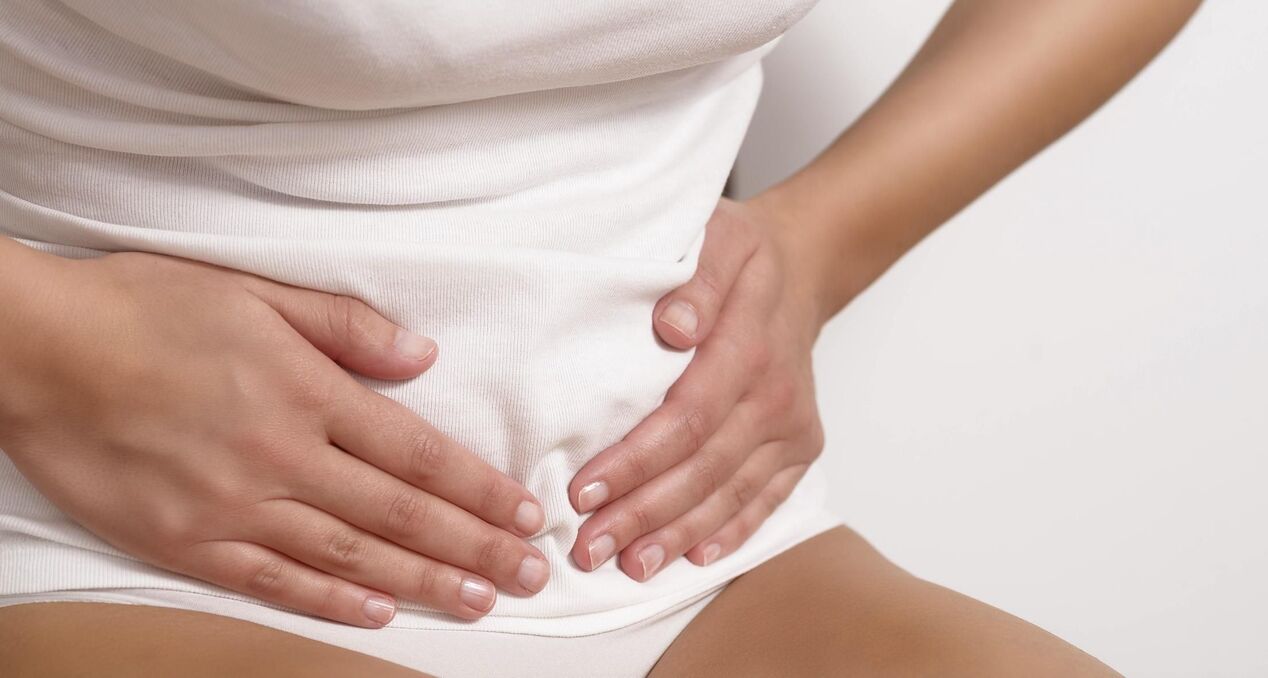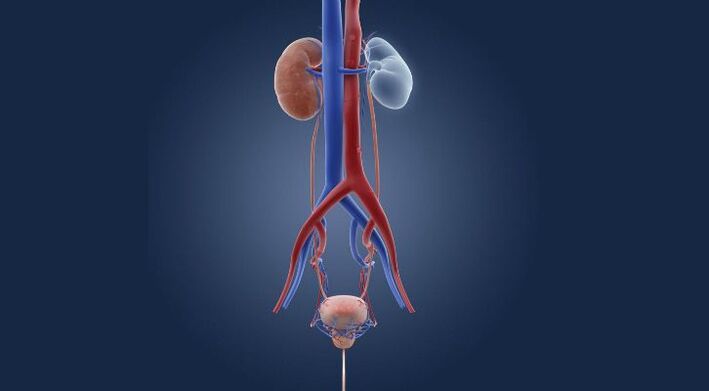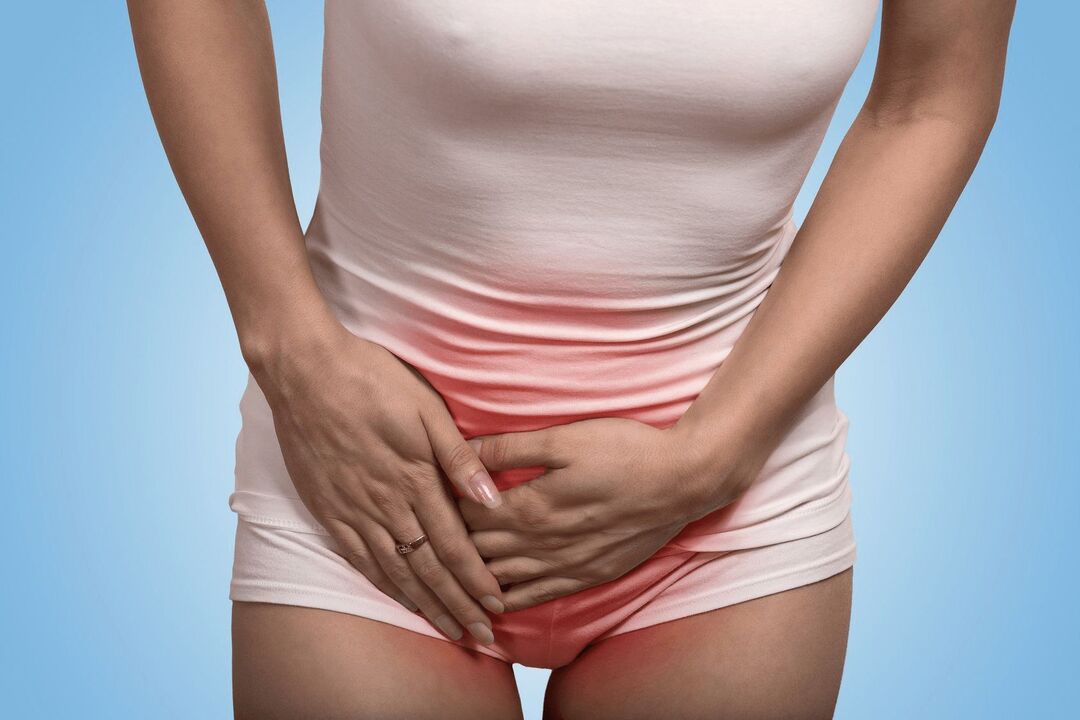Cystitis is an infection of the bladder. This organ is designed to accumulate and excrete urine, but if the lining of the organ is damaged, its function is affected and the person begins to have uncomfortable symptoms. In most cases, the pathology affects only the mucous membranes, but sometimes the inflammatory process also extends to the muscle tissue. Interstitial cystitis is the most difficult disease to deal with.
The disease, which affects mainly women, is related to the anatomical features of the urethra. Inflammation in men is rare, often acting as a comorbidity with chronic prostatitis.
Symptom
The signs of cystitis are so obvious, you can hardly fail to notice them. As a rule, the disease begins acutely, which is why patients notice obvious discomfort in the urinary tract. Among the manifestations of the pathology should be noted:
- frequent urination;
- feeling of incomplete urination;
- cramps and pain when urinating;
- increased body temperature;
- the appearance of a mixture of blood in the urine;
- cloudy urine (due to pus);
- Nausea, pain like during menstruation.
Although there are specific symptoms, the disease can give different manifestations. Hematuria is not always present, but the pain in intensity can only resemble mild discomfort. In any case, if there are signs of pathology, it is necessary to consult a doctor for the earliest possible diagnosis. The disease in the acute stage is best treated in the early stages, but in the chronic form, the duration of the fight is longer.
Types and forms of chronic cystitis
By the nature of the inflammatory process, cystitis is acute and chronic. Depending on the source of development, the disease can be primary (an independent disease) or secondary (inflammation from nearby areas, such as the kidneys).
According to the area of damage to the mucous membrane of the bladder, cystitis occurs:
- total (general);
- clue.
The following clinical forms of cystitis are distinguished:
- catarrhal - non-purulent inflammation of the bladder mucosa;
- phlegmonous - purulent lesions of the submucosa;
- granulomatosis - accompanied by a rash on the mucous membranes;
- hemorrhage, which is characterized by the release of blood in the urine;
- interstitial cystitis - inflammation that spreads to all layers of the organ.
Several rare forms are also distinguished: ulcerative, cystic, nodular cystitis.
The entire spectrum of cystitis is combined into two large groups:
- namely cystitis, caused by pathogens of sexual infections: gonococci, ureaplasmas, chlamydia.
- Nonspecific cystitis - develops due to the fault of opportunistic flora, whose representatives under normal conditions do not lead to disease (for example, E. coli).
Finally, non-infectious cystitis is combined into a separate group. They can occur under the influence of allergic factors, radiation, trauma, heat effects, toxins of parasites.
Causes of cystitis

In most cases, damage to the bladder and the development of the inflammatory process are associated with the penetration of infection, however, by its very nature, cystitis can be toxic and allergic. Once the infection enters, the disease is transmitted in a number of ways:
- ascending - from the urethra to the urethra - affects the bladder;
- descending - in this case, the infection appears due to inflammation of the kidneys, through the ureters, to the bladder;
- lymphatic - by the outflow of lymph through the pelvic organs in the presence of lesions of the genital organs;
- hematogenous - infection enters hematogenously, but this route of transmission is the rarest;
- direct - if the abscess ruptures inside the bladder and pathogenic microorganisms enter the bladder cavity directly, it can also be during catheterization of an organ, infection during surgery.
Usually, E. coli causes cystitis. It occurs in 80-95% of uncomplicated pathology cases. This bacteria is normally found in the rectum, but when it enters the urethra, it causes an inflammatory process. Intestinal bacteria, staphylococcus, fungi, and sexually transmitted diseases can also cause the disease. Symptoms often precede symptoms of vaginitis or bacterial vaginosis, and you may also notice symptoms within a day of intercourse (postpartum cystitis).
Factors that contribute to the development of cystitis
The body with good immunity can cope with the presence of pathogenic microflora, so that the symptoms of cystitis in the patient will not appear. But when exposed to certain elements, it manifests:
- trauma to the mucous membrane of the bladder;
- circulatory disorders of the pelvic organs;
- Hypothermia;
- the presence of other foci in the body, such as a kidney infection;
- decrease in the body's defenses;
- inflammatory diseases of the genital organs;
- lack of vitamins and minerals in the body;
- hormonal imbalance;
- inadequate hygiene, wearing synthetic underwear;
- stress and overwork;
- slow bladder emptying.
When these factors are present, cystitis will rapidly progress, and the chronic disease will move into the recurrent stage. Therefore, in order to prevent recurrence, it is necessary to exclude the influence of provoking factors on the body.
Causes of transition from acute to chronic inflammation
The inflammatory process in the bladder can occur due to various pathogens. Usually it's bacteria, but there are cystitis and viral or fungal causes. If the disease in an acute form is diagnosed on time, properly indicated in the treatment of cystitis, and the patient adheres to all the recommendations of the doctor, then the pathological process can be completely eliminated and willto recovery.
But often women don't go to the doctor, trying to treat cystitis on their own in the hope that things will go away on their own. As a result, precious time is wasted. Microorganisms actively multiply, the intensity of inflammation increases. Once completely "settled" in the bladder, bacteria will not easily give up their place. Inflammation becomes chronic.
Usually when a specialist prescribes treatment for cystitis, the patient starts taking medication and stops the treatment as soon as he feels better. As a result, the pathogen is not completely destroyed, and the survivors divide - chronic cystitis is formed, which is resistant to antibiotic therapy.
Finally, the following circumstances contribute to the development of chronic cystitis:
- general decrease in immune defense, hypothermia;
- hormonal changes (pregnancy, menopause);
- neglect the rules of personal hygiene;
- gynaecological disease;
- chronic diseases of other organs and systems: diabetes mellitus, malignancies.
Symptoms of Chronic Cystitis
In today's medical community, the term "chronic cystitis" is obsolete. It is used "the old-fashioned way", to better communicate with patients. A slow inflammatory process in the bladder is called recurrent cystitis. Its main symptom is the development of 2 or more exacerbations within six months or 3 per year.
The acute phase is accompanied by characteristic symptoms:
- frequent urination;
- pain, burning, pain when urinating;
- night calls;
- feeling of incomplete emptiness, pain in the lower abdomen.
Exacerbation of the disease may be accompanied by a moderate increase in body temperature, the appearance of blood in the urine, its turbidity.
During remission, the symptoms of the disease may disappear completely. But more often, patients experience discomfort on urination and moderate pain periodically for many years.
The most serious consequence of recurrent cystitis is the development of resistance (resistance) of the pathogen to antibacterial drugs and subsequent degeneration of the bladder mucosa. The mucosal epithelium undergoes cicatricial deformation or is replaced by a stratified squamous layer. At this stage, chronic cystitis is no longer curable with antibiotic treatment alone. It is necessary to carry out special medical procedures.
Acute and chronic cystitis: treatment methods
Treatment of acute and chronic forms of pathology is different. Usually, acute cystitis is much easier to treat, since the condition is caused by a microorganism, a doctor will prescribe a course of antibiotics. Antibacterial drugs are quite diverse. They quickly help to stop the onset of the disease, and the systematic use of the fund will help to completely cure cystitis. Fosfomycin-based preparations perfectly cope with inflammation.
Chronic inflammation is more difficult to treat because it is complicated by other disorders. Complex treatment of long-standing cystitis is carried out using several groups of drugs. Antibiotics still lead the way, but your doctor will also prescribe anti-inflammatory drugs, vitamins, and anti-inflammatory drugs. To prevent infection and strengthen the effectiveness of therapy, patients are prescribed herbal therapies, physiotherapy courses.
cystitis in women
Often, cystitis in women is accompanied by exacerbations of chronic inflammation, therefore, statistically, for every two patients who visit the doctor, the disease recurs twice a year.
This does not say too much about the difficulties in treating the disease, but about the need to carefully follow the doctor's prescriptions and eliminate the factors that cause the disease.
cystitis after intercourse

Dorsal cystitis in women is caused by genital abnormalities. As it moves down and within the external opening of the urethra, it becomes more susceptible to invasion by pathogenic microorganisms. In addition, the culprit of cystitis behind the neck is the urethra is too mobile, easily displaced when the penis rubs. In this case, the mucous membrane is easily irritated, and pathogenic microorganisms enter the urethral opening. The symptoms and treatment of this form of the disease are interrelated, so doctors will approach the problem individually in each clinical case.
In addition, the cause of cystitis is alternating anal sex with vaginal sex, which is completely impossible, since the microflora of the rectum penetrates directly into the vagina. and adjacent urethra. One factor in the development of bacterial infections is the introduction of bacteria by hand, which does not produce enough vaginal mucus, causing microfissures.
The symptoms of anal inflammation are not different, but patients may notice their occurrence directly related to sex - usually discomfort occurs during the first 12 hours.
The treatment of cystitis behind the neck is individual, because it is first necessary to determine the cause of the disease and correctly prescribe the method of treatment. With an abnormality of the urethra, the doctor will recommend plastic surgery, as a result the problem will disappear. Both surgery and hyaluronic acid injections are possible. If an STI infection occurs in an intimate relationship, then antibacterial drugs will be required, followed by restoration of the vaginal microflora.
What does blood in urine say?
The appearance of blood in the urine indicates the development of acute hemorrhagic cystitis. It does not appear at the end, but accompanies the entire process of urination. The presence of red blood cells gives the urine a pink color. In addition, the urine may be a "flesh" color, that is, brown in the presence of brown filaments, threads, or scales of mucus.
Usually, when urinating, blood will be accompanied by severe pain, pain in the bladder and a feeling of pulling in the lower back. Presence of blood in the urine is a compelling reason to seek medical attention.
Cystitis during menstruation
In some women, exacerbations of cystitis occur due to hormonal changes during menstruation. During menstruation, the pelvic organs are most susceptible to infection, so the following can cause it:
- inflammatory diseases of female genital organs;
- hormonal fluctuations;
- allergic reactions to intimate hygiene products;
- decrease in the body's defenses;
- non-compliance with personal hygiene;
- nonspecific infections, mycoses, STDs.
Under the influence of these factors, pathogens will enter the urethra and urethra, causing inflammation. Usually, the exacerbation of the disease occurs during ovulation, as well as 1-2 days before the onset of menstruation. Vaginal discharge becomes an excellent breeding ground for pathogenic microflora. Symptoms of cystitis during menstruation are typical, but are complicated by the characteristic symptoms of menstruation - pain and pulling in the lower abdomen.
The doctor can determine the cause of the pathology after taking the medical history and studying the results of the diagnosis in the laboratory. The treatment regimen is standard, but concurrent treatment of gynecological conditions may be required if an infection of the genitalia is diagnosed. It is important to observe personal hygiene, strengthen the immune system.
Pregnancy and cystitis

As a result of studies, doctors discovered that asymptomatic bacteriuria was detected even before pregnancy, so that the disease only manifests itself during pregnancy. The reason for this is:
- changes in the hormonal background and the ratio of progesterone and estrogen in the body of the expectant mother;
- violation of urodynamics when the size of the uterus increases;
- weakening of the ligamentous apparatus, greater mobility of the organ, but a decrease in its peristalsis and tone;
- The renal pelvis dilates due to increased blood circulation in the renal pelvis.
The latent course of the pathology complicates early diagnosis. Cystitis during pregnancy can be treated even with antibiotics. Your doctor will prescribe medications and dosages that are safe for the fetus.
Diagnostic method
The symptoms of cystitis are very specific, but the doctor will still order a series of tests to finally find the causative agent and determine the nature of the disease. The specialist will take a medical history, analyze the patient's complaints, and conduct an external examination by palpating the bladder area. The following diagnostic methods are used:
- ultrasound - using ultrasound, you can determine the degree of the inflammatory process, its prevalence, as well as assess the condition of the urinary system, genital organs;
- cystoscopy - examination of the organ with an endoscope, which allows you to assess the condition of the bladder mucosa;
- cystography - examines the bladder using a contrast medium.
In women, treatment should begin with identification of the causative agent. A wide range of laboratory tests is required: general urinalysis, Nechiporenko analysis, bacterial culture, tissue biopsy, polymerase chain reaction (for more accurate identification of the causative agent). To assess the extent of the inflammatory process, doctors may send blood tests. If an inflammatory disease of the female genitalia is suspected, a gynecologist may be required and the tests prescribed by the doctor may be required.
Treatments
In inflammatory diseases of the organ, doctors use therapeutic and surgical methods of treating the pathology. In most cases, the disease can be cured with appropriate formula drug therapy with the addition of physical therapy.
Drug therapy consists of a combination of many different classes of effective drugs, depending on the nature of the disease. Patients may be offered:
- anti-inflammatory drugs - serve to reduce swelling of the mucosa and eliminate pain, the inflammatory process is alleviated;
- antispasmodics - are used to relieve painful symptoms, they effectively eliminate spasm of the bladder;
- antibacterial therapy - a group of drugs that act directly on the causative agent of the disease;
- antifungal drugs - recommended if cystitis is caused by a fungus or is complicated by it (for example, with a combined bacterial-fungal infection);
- phytoprepatches - drugs in tablets and other forms with antibacterial and anti-inflammatory properties.
In some cases, doctors prescribe drops for patients instead of taking them. Bladder lavage is performed in the clinic. With the help of a special catheter, the desired concentration of the drug is introduced, which cannot be achieved in other ways. Before the procedure, the patient needs to self-medicate to allow the drug to act on the mucosa as long as possible.
Surgical treatment is used only in rare cases, when the inflammatory process causes anatomical changes or in cases of severe recurrent infections. In this case, laser correction is performed. For example, in retroorbital cystitis, for many women, the only treatment option is transurethral distal transposition.
Diet in the treatment of cystitis

It is imperative to follow a diet, since spicy and salty foods contribute to the appearance of ulcers on the mucous membranes. Other products are irritants that interfere with recovery:
- foods high in sugar;
- citrus fruits, sour, fermented foods;
- spice;
- tomatoes and all dishes with tomatoes, additives (ketchup, sauce, tonic);
- soy sauce and vinegar;
- nuts and chocolate.
To speed up recovery, patients are recommended a light and nutrient-rich diet. It is necessary to exclude fried foods, smoked meats, marinated, fatty foods. It is best steamed, stewed or boiled. Eliminate all foods that may cause an allergic reaction.
An attack of cystitis can also be provoked by heavy food in which the patient is constipated. With stagnation of fecal masses, intestinal motility worsens, stagnation occurs in the bladder, as a result the mucosa is again irritated. Because of the high protein content, you should not eat too much meat, fish, beans, cheeses. Replace them with high-fiber foods - vegetables and fruits allow.
During treatment, try to eat at home, cook for yourself, and don't introduce new foods or dishes on the menu. Remember that the diet does not include alcohol entirely, and also limit coffee and tea. Juices, infusions and decoctions of herbs, fruit drinks and preparations will be useful. It is better to replace plain water with slightly alkaline mineral water.
Physical therapy
Among the methods of disease treatment, physical therapy is widely applied. As a rule, it is recommended at the recovery stage, when the acute inflammation of the bladder has been eliminated and there is a tendency to active recovery. Physiotherapy is also effective for submucosal localization of pathogens, when antibacterial drugs are not effective. When physical therapy is used:
- phonophoresis;
- electrophoresis;
- acupuncture therapy;
- UHF;
- modulation current.
The session does not last long, however, 10-15 sessions are required to be effective. Definitive treatment of cystitis with many combination methods will help the disease completely recover.
Answer the question
How long does cystitis live?
The duration of cystitis depends on the form of the disease. The acute phase lasts 7-10 days, after which, with appropriate treatment, the disease recovers, but the chronic form of the disease can last for several months, reminding itself of exacerbations.
Do you have to take a hot bath or shower with cystitis?
Taking a hot bath or shower really helps to relieve spasms and aches, however, these thermal effects are contraindicated in the case of cystitis, as this contributes to the exacerbation of the inflammatory process.
Which doctor to deal with and what analysis to hand over?
Women suspected of having cystitis should contact a general practitioner, men - a urologist. If needed, the patient can be referred to a gynecologist. Tests - urinalysis, blood tests and ultrasound or cystoscopy.
How does age affect the course of the disease?
Typically, cystitis occurs in women 20–45 years of age, and is associated with active sex drive, unstable hormone levels, and a higher risk of gynecological problems. In older women, the pathology occurs less often, and it is associated with a weakened immune system.
Can chronic cystitis be cured?
Like any other chronic disease, cystitis occurs with periods of exacerbation and remission. It is very difficult to completely cure this disease, but with the right treatment, you can achieve stable and long-lasting remission without any symptoms from the urinary system.
Do I need a special diet for signs of cystitis?
Yes, during the acute phase of the disease, the patient should adhere to the diet, except for salty, spicy, and irritating foods. Despite frequent urination, you should not limit drinking a lot of water. You can drink up to 2 liters of purified water, brewed water, weak tea. But alcohol and coffee in the acute period are prohibited.
What features should be considered when choosing an air unit?
Let's start with the fact that the selection of drugs and the appointment of an antibiotic regimen is a task for only one specialist: a urologist, a nephrologist, a treating physician. Arbitrarily discontinuing treatment for cystitis or changing the treatment method is not acceptable.
The use of tetracyclines, cephalosporins in cystitis rapidly leads to resistance of pathogens. Therefore, drugs from these groups are practically not used to treat cystitis. Doctors prescribe ampicillin, fluoroquinolones, and various combinations of respiratory agents. Herbal medicines are also widely used, the main advantages are good tolerability and almost no contraindications. Preparations from this group can be used to treat pregnant and lactating mothers.
The doctor will choose an individual method, analyzing the data of each clinical case. To determine the sensitivity of the pathogen to a particular antibiotic, a special study is carried out - bacteriological analysis of urine with culture on nutrient medium.
How to self-treat cystitis at home and can it be done?
If symptoms of cystitis develop, see a urologist, nephrologist or general practitioner as soon as possible. Only a specialist can accurately assess the features of the clinical picture, conduct a comprehensive examination, make an accurate diagnosis, and prescribe the necessary treatment.
But often patients are faced with the fact that the doctor has scheduled an appointment for a certain time, and the pain needs to be relieved now. To slow down the progression of the pathological process, adhere to the drinking regimen - drink about 2 liters of water, drinks, fruit drinks. Hypothermia is a common cause of worsening of the condition, so you should wear warm clothing and protect yourself from drafts.
Also try to avoid overwork. Rest (physically and sexually) will help you wait for your therapist's appointment. It is undesirable to arbitrarily take pain relievers and antispasmodics without needing - they can "grease" the clinical manifestations of the disease and make it more difficult for the doctor to make an accurate diagnosis.




























